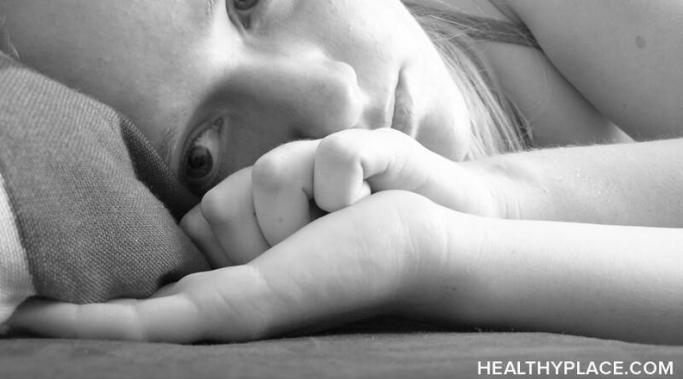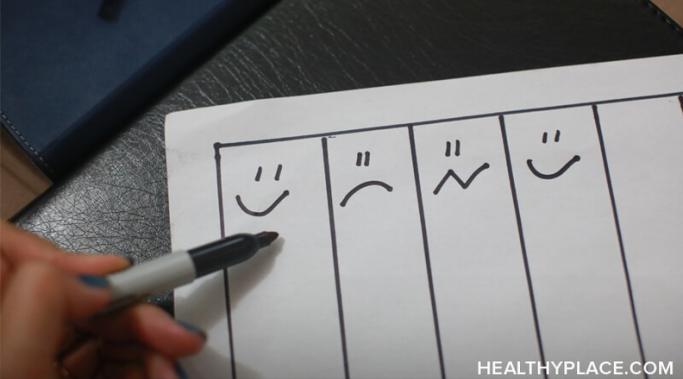The first thing I thought of this morning was killing myself. Literally, as consciousness slowly overtook my brain thoughts of suicide were all that were there.
It’s a bad day.
Impact of Bipolar
A while back I wrote on a campaign that was working to change the face of mental illness. It presented real, live people with mental illness that challenged the assumptions that people might have about mental illness. Namely that we’re all unemployed, unsuccessful, useless crazy people.
Now, I did have some problems with the campaign but I applauded their attempt to get people to realize that mental illness is about real people and that each person with a mental illness is an individual with all the possibilities of any other individual in our society.
And I found myself putting my own face on mental illness, bipolar disorder, just the other day. I did it by using the phrase, “. . . people with bipolar, just like me.”
I hear from people over and over again how they can’t reach out to others because they are too sick. Normally this is because the person is too depressed, but it could be because the person is too anxious or in some other mood state. And I know for myself that asking for help can be the scariest thing in the world, but if we ever hope to turn the tide, if we ever hope to beat back bipolar, we need to be able to reach outside ourselves for help and support.
I am not an angry or an aggressive person. This is not to suggest I don’t have my moments, as we all do, but overall, I have far fewer issues with anger than most people I know. There are lots of reasons for this, I’m sure many have to do with my psychology the way I view anger (I view it as pointless and particularly undesirable).
Nevertheless, it seems that people with bipolar disorder do, on the whole, have anger issues. I’m a bit surprised to hear this as anger is not a diagnostic feature of bipolar disorder, but people write in again and again and talk about either having bipolar and being very angry or being with someone who has bipolar and this partner being very angry.
But are these just anecdotal accounts or do people with bipolar disorder have aggressive and angry tendencies?
I get asked about the sex life of the bipolar on a regular basis. People want to know what’s “normal” or can they have that mythical “normal” sex life. Some of these people are partners of people with bipolar and others are the people with bipolar themselves. It seems we’re all a bit mystified as to how this mental illness affects our sex lives.
Well, I can’t say what is normal for you, but I can tell you what I know about bipolar and sex.
Last time, I wrote about the terrors of getting on new bipolar medication. Many people identified with this, including one commenter who said:
Sounds all too familiar. I’ve been drug free for several years and seriously doubt that I will ever put myself through that trial and error program again . . . at least for me, that relief is not to be found at the bottom of an orange vial with a childproof cap. I hope you find something to relieve the pain. I also hope you consider the notion that you’re likely stronger and more resourceful than you think you are.
Now, I’m not calling out this commenter for doing anything wrong. I have no problem with his comment, nor with him. However, I find this comment insulting. Not because the commenter meant it to be, but because it suggests that people who don’t take medication for bipolar disorder are “stronger and more resourceful” than those who do.
I have been on every bipolar medication you can name and likely a few you could not. I have been on more medication combinations than I can remember. I have spent years dealing with medication side effects. There is very little medication pain that I cannot tolerate. I have taken medications that have made me feel amazingly well and bipolar medications that have made me feel intolerably ill. I’ve seen treatment miracles and treatment devastations. And still, I feel nothing but terror when I think of taking new bipolar medication.
Many people make New Year’s resolutions. I don’t endorse this practice, personally, mostly because I think people are quite unrealistic when they do it. They don’t make goals that make sense and they then place far too much pressure on themselves to turn the goals into a reality.
And possibly, if you’re bipolar, it might be even worse. You might have had the best of intentions when making a resolution like to quit smoking, take your medications as prescribed or create a set bedtime, but by now, you’ve probably noticed that you haven’t quite stuck to your resolution. And if you’re like many bipolars, you’re probably not feeling too good about that.
I have talked many times about how important a routine is in bipolar disorder (Limitations and Rules that Keep Us Safe). There are many reasons for this, but one of the main ones is because bipolar disorder is considered a circadian rhythm disorder by many medical professionals. Your circadian rhythm is critical to your functioning as a human as it tells your body when to sleep and when to be awake (among other things) and trying to go against it is like swimming upstream. Assuming bipolar disorder is, indeed, a circadian rhythm disorder, we should do everything we can to work to regulate our circadian rhythms in a healthy manner. Keeping a strict bipolar routine is one major way of doing that.
After reading my last post, Starting Conversations About Bipolar Disorder (When You Don’t Have Bipolar), a commenter requested a similar piece on how to start conversations on mental illness when you do have bipolar disorder. I thought this was a good question as it’s as hard for people with a mental illness to bring up this tough subject as it is for those around us. After all, we don’t want to frighten people or get into major emotional upset.
So are there things to consider when bringing up bipolar disorder with people who don’t have a mental illness?





![MP900178847[1]](/sites/default/files/styles/blog_listing/public/uploads/2013/01/MP9001788471.jpg?itok=Ts8tL5qv)
![MP900337355[1]](/sites/default/files/styles/blog_listing/public/uploads/2013/01/MP9003373551.jpg?itok=-JTBPXwz)


